Page last updated May 25, 2022
PGC 68138
(= ESO 048-017)
A magnitude 13.8 spiral galaxy (type SB(s)m) in Octans (RA 22 08 55.6, Dec -73 22 55)

Above, a 12 arcmin wide DSS image centered on PGC 68138
PGC 68305
(= ESO 146-014)
A magnitude 14.2 spiral galaxy (type Sdm spw) in Tucana (RA 22 12 59.8, Dec -62 04 06)
Note About Classification: The type is taken from the Spitzer Survey of Stellar Structure in Galaxies. The "spw" indicates a spindle (or edge-on galaxy) with a warped disk; for such galaxies, determining the classification is more difficult than for "face-on" galaxies.

Above, a 12 arcmin wide DSS image centered on PGC 68305
PGC 68368
(= CGCG 428-057)
A magnitude 15(?) lenticular galaxy (type (R'?)SA(rs)a?) in Pegasus (RA 22 14 32.0, Dec +13 46 22)
Physical Information: Based on a recessional velocity relative to the Cosmic Microwave Background radiation of 6940 km/sec (and H0 = 70 km/sec/Mpc), PGC 68368 is about 320 to 325 million light-years away. Given that and its apparent size of about 1.05 by 0.95 arcmin for the central galaxy and about 1.4 by 1.4 arcmin for the suspected outer arms (from the images below), the galaxy is about 95 to 100 thousand light-years across and if the outer arms are real, they must span at least 130 thousand light-years.
Classification Note: NED lists this as a low surface brightness spiral similar to Malin 1, and an "enhanced" version of the closeup image does show very faint apparently spiral structures extending beyond the far brighter interior; but the type shown above must be considered very uncertain, as indicated by the question marks.
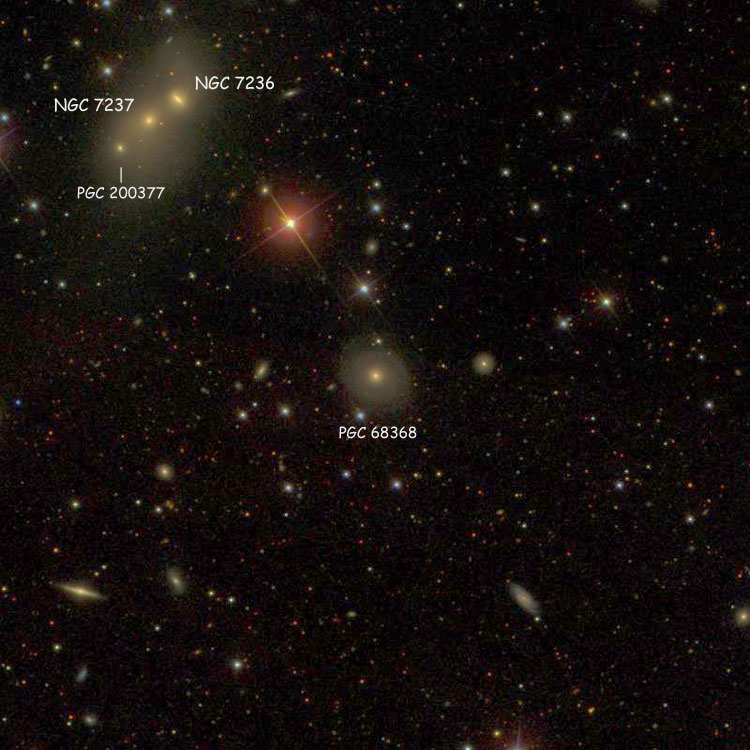
Above, a 12 arcmin wide SDSS image centered on PGC 68368, also showing NGC 7236 and 7237 and PGC 200377
Below, a 2.0 arcmin wide SDSS image of the galaxy
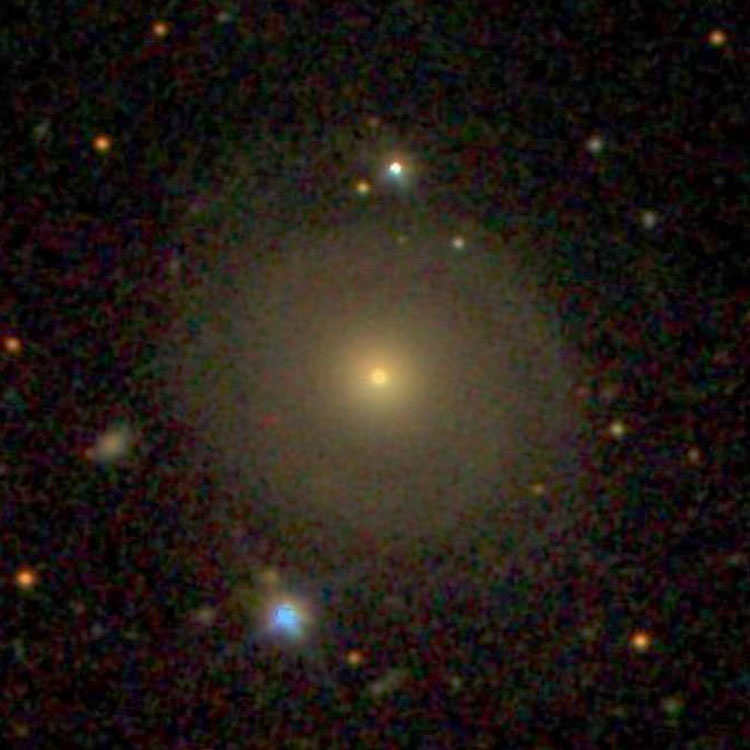
Below, the image above "enhanced" to show suspected outer arms
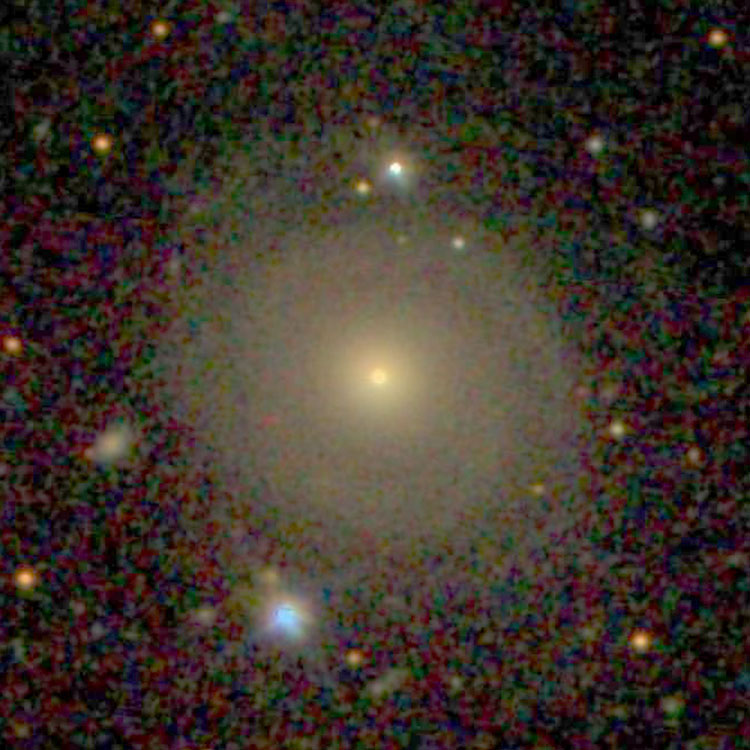
PGC 68420
(= UGC 11964 = MCG +03-56-019)
A magnitude 15.5(?) superthin spiral galaxy (type Scd? sp) in Pegasus (RA 22 15 29.0, Dec +19 13 14)
Physical Information: Based on a recessional velocity relative to the Cosmic Microwave Background radiation of 1070 km/sec (and H0 = 70 km/sec/Mpc), PGC 68420 is about 50 million light-years away, considerably closer than redshift-independent distance estimates of about 75 to 135 million light-years. Given that and its apparent size of about 2.1 by 0.15 arcmin (from the images below), PGC 68420 is about 30 thousand light-years in diameter if at the Hubble Flow distance of 50 million light-years, and about 45 thousand light-years in diameter if at the lower end of the redshift-independent distance estimates (namely about 75 million light-years).
Classification Note: As an edge-on galaxy (whence "sp" for "spindle"), its type is based on the thickness of the disk and its central bulge, and as a "superthin" galaxy, PGC 68420 doesn't have much thickness anywhere. Still, various sites list types of Sc, Scd and Sd; so Scd? seems a reasonable compromise.
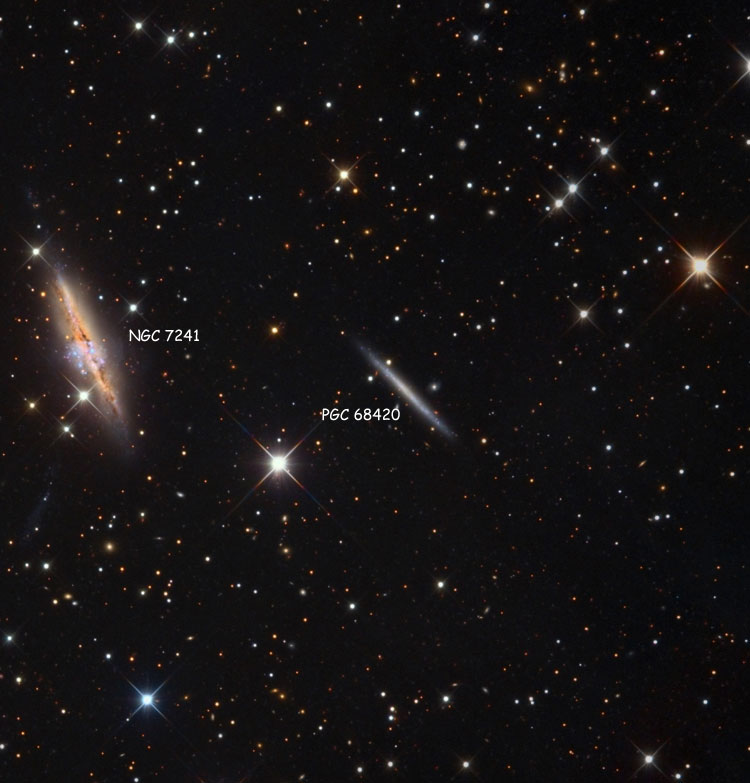
Above, an 11.5 by 12 arcmin wide image centered near PGC 68420, also showing NGC 7241
(Image Credit & © above and below Adam Block/Mount Lemmon SkyCenter/University of Arizona; used by permission)
Below, a 2.5 arcmin wide image of the superthin galaxy
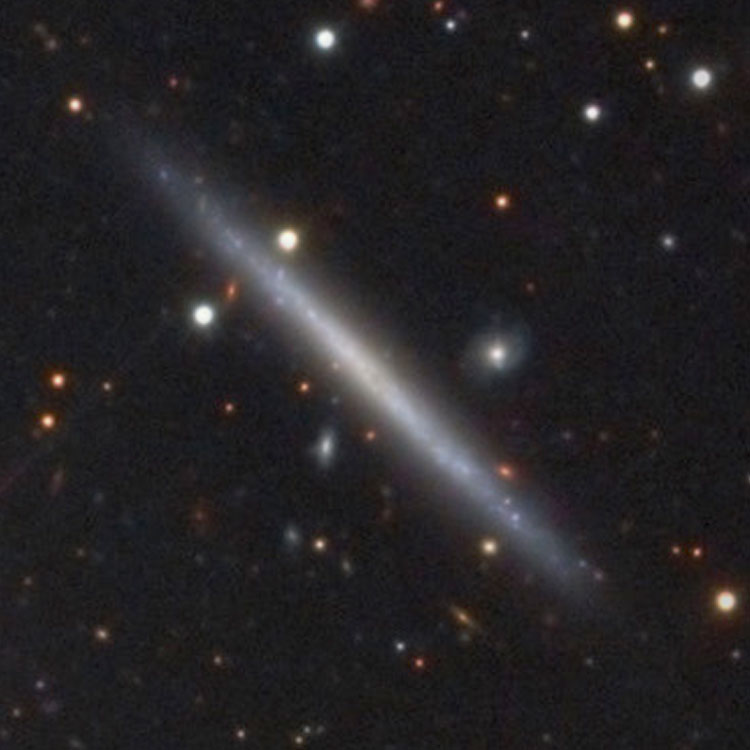
PGC 68450
(= ESO 237-049)
A magnitude 14.1 spiral galaxy (type Sd sp) in Grus (RA 22 16 03.3, Dec -47 39 45)

Above, a 12 arcmin wide DSS image centered on PGC 68450
PGC 68478
(= ESO 289-010)
A magnitude 13.9 spiral galaxy (type Sd spw / E(d)8-9) in Grus (RA 22 16 43.3, Dec -47 07 08)
Note About Classification: The type is taken from the Spitzer Survey of Stellar Structure in Galaxies. The / E(d)8-9 means that the spiral galaxy is embedded in a disk-shaped elliptically shaped fainter outer region ("true" ellipticals are almost never more elongated than class E4 or E5). As indicated by "spw" in the "spiral" part of the classification, this is a warped spindle, or edge-on galaxy with signs of a warped disk, which makes determining its structure difficult, even in the infrared.

Above, a 12 arcmin wide DSS image centered on PGC 68478
|